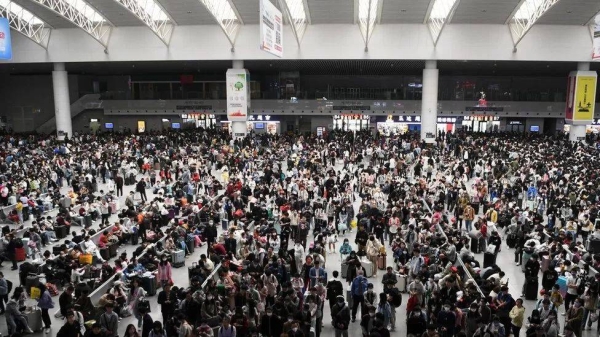
TOKYO (Reuters) -Japanese big manufacturers’ sentiment improved to pre-pandemic levels in the first quarter while companies stepped up capital spending plans, suggesting the export-reliant economy was benefiting from a solid recovery in global demand.
Confidence among big non-manufacturers also recovered from three months ago, underscoring the fading strains from the coronavirus pandemic, a central bank survey showed on Thursday.
The data offers some relief for policymakers striving to revitalise the pandemic-hit economy as a fourth wave of infections raises uncertainty about the outlook.
“The results underline the Bank of Japan’s view the economy continues to recover moderately,” said Yoshiki Shinke, chief economist at Dai-ichi Life Research Institute.
“It turns out that renewed state of emergency curbs have had limited impact on business sentiment thanks to solid exports and goods demand,” he said.
The headline index measuring big manufacturers’ sentiment rose to plus 5 in March from minus 10 in December, the BOJ’s closely watched “tankan” survey showed, beating market forecasts of a flat reading.
The third straight quarter of improvement lifted the index to the highest level since September 2019, as the benefits of the global recovery spread to a wide range of manufacturers including machinery and car makers.
While hotels and restaurants continued to suffer from the pandemic, the rebound in manufacturing activity spilt through to a broader improvement in conditions that helped other service-sector firms.
That led to an improvement in big non-manufacturers’ sentiment index to minus 1 in March from minus 5 in December.
“The further strong rebound in the Q1 Tankan supports our view that the economy’s recovery from the pandemic will gather pace again soon,” said Tom Learmouth, Japan economist at Capital Economics.
Backed by prospects of recovery, big firms expect to boost capital expenditure by 3.0% in the year that began in April, more than market forecasts for a 1.4% gain. That would follow a 3.8% cut in spending plans for the year that ended in March.
Capital spending plans among firms of all size and sectors rose 0.5% in fiscal 2021, the first positive projection made at the start of a business year since relevant data became available in 1984.
OUTLOOK MURKY
There were concerns, however, the rebound from the pandemic’s initial hit may have peaked. Big manufacturers and non-manufacturers both expect business conditions to stay largely flat three months ahead, the tankan showed.
Some retailers were seeing signs of weakening demand for stay-home goods like grocery and household electronics, a BOJ official told a briefing.
“There were some automakers fretting about the impact chip shortages could have on their output,” the official said.
A fire at Japanese chipmaker Renesas Electronics is seen aggravating chip shortages, said Taro Saito, executive research fellow at NLI Research Institute.
“It’s unavoidable that output will drop. It’s a risk factor that is not reflected in today’s tankan,” he said.
A tankan index gauging price moves showed companies saw input costs rising, which could also hurt their bottom lines.
Like many countries, Japan deployed massive monetary and fiscal stimulus over the past year to lift the economy back from a record postwar slump.
Many analysts expect the economy to have contracted in the first quarter but see it gradually emerging from the doldrums as solid exports offset some of the weakness in consumption.
The BOJ tankan indexes are derived by subtracting the percentage of pessimistic respondents from optimistic ones. A negative figure means pessimists outnumber optimists.












